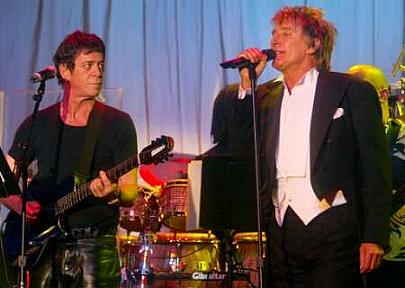ROD WITH WITH LOU REED AT LAST MONTHS PRE-GRAMMY PARTY
It was Stewart’s idea to revive songs like George and Ira Gershwin’s ‘They Can’t Take That Away From Me’ and Cole Porter’s ‘Every Time We Say Goodbye’. The shaggy-haired singer, who started as a brash hard rocker and ventured into disco, was ready for yet another dramatic change. At 58, he was badly in need of a hit, having released several mediocre sellers in the 1990’s.
Stewart offered the project to Warner Brothers but was turned down. But Clive Davis, head of J Records and a longtime musical impresario with an uncanny ear for hit records, was interested, though only if Stewart agreed to re-record the tunes, making his raspy voice more prominent in the mix.
The sales campaign for ‘It Had to Be You’ had nearly a half-dozen elements. “When you have a record that doesn’t have a place on radio, you can’t expect to get airplay,” said Tom Corson, a J Records executive vice president. “So where do you go? You go to print and TV.”
Well before the album’s October release, a pair of listening parties – one in New York City, another in Los Angeles – were set up, with Stewart singing two songs before a few hundred bigwigs from radio, television, print and retail. A six-figure direct-marketing TV campaign began five weeks before the release. Anyone who missed the commercials, which ran on VH1, the Food Network and A&E, would probably stumble across Stewart on other channels. He was interviewed on the Charlie Rose show, CNBC and CNN. Good Morning America was particularly good to Stewart.
Television turns out to be the greatest end-run option available to legacy artists. Older fans, who don’t read Rolling Stone, won’t know an album is even out unless they hear about it on TV.
It isn’t just talk and morning shows, either. Labels have discovered that comedies and dramas are eager to feature 1970’s artists as background music. A few months ago, when Universal readied a double-CD collection of Elton John’s greatest hits, they approached the music supervisors of popular TV shows and asked whether they were interested in buying the rights to John classics on their programs. A handful of shows signed on fast. “There was an episode of Scrubs during sweeps weeks that featured Heather Locklear, and the show used the song ‘The Bitch is Back’,” said Bruce Resnikoff, president of Universal Music Enterprises. “Presidio Med,” a CBS medical drama, “bought the rights to ‘Someone Saved My Life Tonight.’ The goal was to feature this music in such a way that it became a part of the culture of people watching TV.” Released in November, John’s “Greatest Hits 1970-2002” rose to No. 12 on the Billboard charts, and it’s still in the top 50.
As Stewart achieved TV ubiquity, J Records made sure that ‘It Had To Be You – The Great American Songbook’ was heard far and wide. Through a deal with Continental Airlines, the album could be heard through headsets on hundreds of flights. The label hired Movie Tunes, which distributes songs to movie theaters to be played in the minutes before a film starts. Stewart’s new material was heard in 10,000 screens nationwide. The label also retained Target Music Marketing, which distributed the songs to high-end restaurants, upscale clothing stores and other shops, which played the songs over their in-house sound systems. Another company, Street Syndicate, handled the lower end, placing the songs in stores where 20-year-olds shop. (The theory was that young folks who heard the album would buy it for their parents.)
J Records sensed a hit the week before the release date, a hunch confirmed when ‘It Had to Be You’ sold 115,000 copies through the direct-market campaign alone. A figure closer to 50,000 had been anticipated. When the response in stores was just as strong, Corson started pitching to radio.
Stewart said his career longevity, and that of his contemporaries, could stem from the quality of work they still produce: “We’re still groundbreakers; we’re still doing it at this age. Much as the critics might laugh at the Rolling Stones and Paul McCartney, they’re still packing them in.”
(courtesy CNN)

